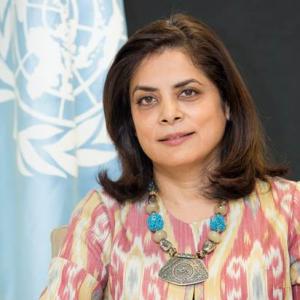Remarks UN Resident Coordinator on SDGs Annual Conference - Plenary I
-
Excellency, Minister of National Development Planning, Professor Bambang Brodjonegoro
Distinguished speakers and panelists,
Ladies and Gentlemen
On behalf of the UN, our congratulations to the Government of Indonesia for successfully launching the SDGs Roadmap 2030 and for your leadership on these Goals.
I am delighted that today we can all come together for the SDGs – from national government, provinces the private sector, civil society and development partners.
We welcome the focus on SDG 14 – Life below water, and our appreciation to Bappenas and partners for making this event possible.
Excellencies, Ladies and Gentlemen,
Globally, oceans are warming and becoming more acidic, causing coral bleaching and threatening biodiversity. Fish stocks in some places are collapsing from overfishing. Pollution is filling the seas with trash and poison.
The UN believes that these problems can all be reversed and prevented with decisive, coordinated action.
With less than 11 years left to achieve the 2030 Agenda for Sustainable Development, it is clear we must move much faster and innovate. We must do even more to address the conflicting demands from industry, fishing, shipping, mining and tourism that are creating unsustainable levels of stress on marine and coastal ecosystems.
We have the blueprints, the frameworks and the plans. What we need is urgency, political will and decisive action.
As the world’s largest archipelago nation, more than 70 million people depending on the ocean and coastal fisheries for protein and livelihoods. Coastal and marine related activities are estimated to contribute 20 percent of Indonesia’s GDP.
Indonesia’s leadership is critical in ensuring the successful implementation of SDG 14 – to conserve and sustainably use the oceans, seas and marine resources for sustainable development.
Around 54 percent of Indonesia’s animal protein supply comes from fish and seafood and Indonesia supplies 10 percent of global marine commodities.
Globally, illegal, unreported and unregulated fishing remains one of the greatest threats to sustainable fisheries, the livelihood of those who depend upon them, and marine ecosystems. The Government of Indonesia has taken important steps towards combating these issues.
We remain steadfast with you in your journey towards accelerating the SDGs including SDG 14. As outlined by the Executive Secretary of UNESCAP this morning, it is worth reiterating the critical role of SDG accelerators: finance, potential of youth, empowerment of women, technology and good governance. The UN is working with Indonesia, other UN Member States, foundations and the private sector to protect life under water. The following are just a few examples of our efforts on SDG 14.
The UN is working with diverse stakeholders in Indonesia, including governments, private sector and local communities, to promote sustainable fishing practices to suppliers and retailers
Through our partnership with the Ministry of Marine Affairs and Fisheries and selected local governments, FAO is promoting the Indonesian blue economy through the Blue Growth Initiative by generating knowledge products and developing conservation and zonal plans through an Ecosystem Approach for Fisheries Management to improve the sustainable management of marine resources. UNIDO is supporting livelihoods of coastal communities, particularly smallholder fishing communities across the country.
UNDP’s Global Commodities Programme is promoting certification programmes for sustainable seafood products and its supply chain. It is also engaged in helping address plastic and marine pollution including developing integrated actions for tacking marine debris working with relevant Ministries and Agencies.
Through the Innovative Finance Lab and in cooperation with the BAPPENAS Finance Hub, UNDP, the Government and investors working together on new financing mechanisms related to blended finance, Islamic finance, green finance and exploring blue finance in the forms of Blue Bonds that will directly contribute to SDG 14. And tomorrow, UNICEF with sign an MoU with Bappenas on an impact bond aiming to prevent family separation.
Effectively addressing marine issues also requires new forms of international cooperation. An excellent example is the Archipelagic and Island States Forum, in which Indonesia is playing a catalytic role with UNDP support. AIS brings together public and private actors from many countries to identify new solutions that directly contribute to the SDGs, including SDG 14.
It is important to recognize the interlinked and indivisible nature of the SDGs – advancing towards these goals will only be achieved through integrated solutions and multi-stakeholder partnerships
We look forward to continuing our collaboration with Indonesia in the realization of SDG 14 targets through research, evidence-based policy advice, capacity building, and the facilitation of knowledge-sharing with other countries.
And, we look forward to having Indonesia’s active participation in the 2020 UN Ocean Conference in Lisbon, June next year, which will present an important opportunity to showcase Indonesia’s achievements and to commit to further actions.
Our appreciation and thanks to Bappenas and all partners.
Terima Kasih Banyak.
Speech by


















